 About GamePeople
About GamePeople
Subscribe to the Family Gamer column:![]() RSS or
RSS or
![]() Newsletter.
Newsletter.

Format:
360
Genre:
Shooting
Style:
Singleplayer
Buy/Support:
Support Andy, click to buy via us...
Other GamePeople columnists have reviewed this from their perspective - huh?:
Reporting Gamer (360)
Family Gamer (PS3)
Family Podcast (PS3)
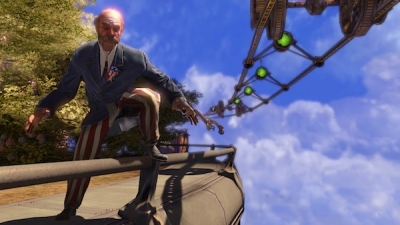
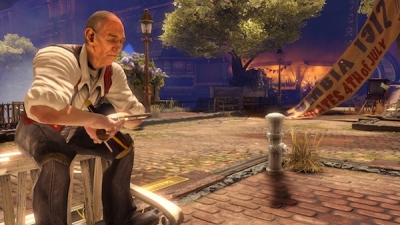
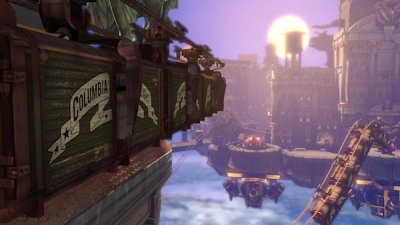
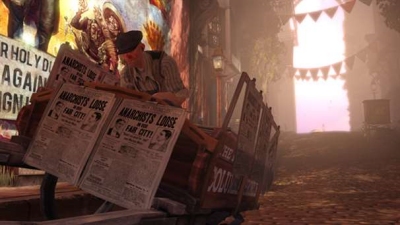
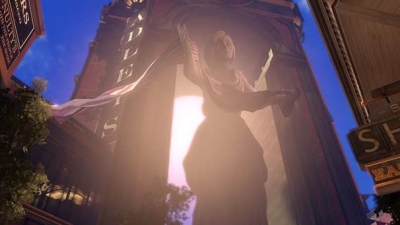
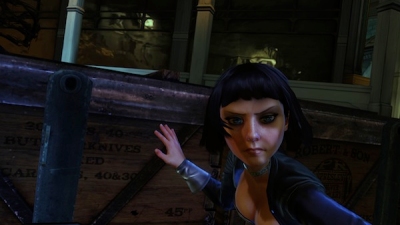
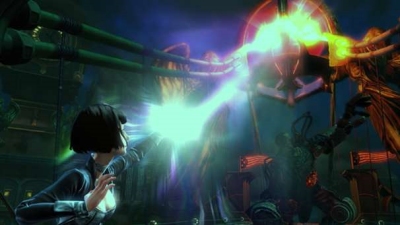


Bioshock Infinite takes us from underwater Rapture to the cloud city of Columbia. More critical than a fresh location though, is if this time its strong sense of place offers more than just somewhere to play and becomes an experience where we are challenged to genuinely engage with our real world assumptions.
Games are interesting because of people - but it's not usually the people you play and meet in them. The individuals that invent them, develop them and then play them make games something interesting. It's because games are all about people that they are part of the tapestry that helps us make sense of the world.
Bioshock may have stared a blank protagonist, but it was a game by and about people. Religion, ideology, absolutism, belief systems and aesthetics blend to create a seething cauldron of competing ideas that eventually collapse in on themselves to challenge any solid moral ground or compass. It was a beguilingly human experience.
Ken Levine was the driving force behind much of the direction of Rapture - the world of Bioshock. Hear him talk about it and he easily moves from videogame mechanics to ideologically and religious discussions. His fingerprints are clearly all over it.
It's a cultural weight the game couldn't quite balance with its game play though. The nimble and flexibly nature of the fighting outstrips the slightly polarised moral decisions. While the combat mechanics represented the pinnacle of first person shooting, Bioshock felt like it didn't quite know what to do with the surprising sense of place it created. The caliber of the setting was eventually squandered somewhere along the way.
It was clear where Levine was heading with this though. Bioshock is a videogame that wants to use its interactive nature to unravel a moral story. It says things in a way not possible with a book or film: it's coy and oblique, it's playful with heavy subjects, it takes its time to reach a conclusion. Bioshock achieved much of this, but at the same time left so much out to dry.
On this basis, after the slight sidetrack of a Levine-less (but nonetheless polished) Bioshock 2, the prospect of Bioshock Infinite is both intriguing and mouthwatering. Not that I need a new location or premise for the series, or that I have any desire for the currently in-vogue rebooting of franchises, but this represents an opportunity for Levine and the team to capitalise on the good work of the original -- as well as match their gaming mechanics stride with finer cultural work.
What will be much more significant is the quieter story.
Spend some time with Bioshock Infinite and the world is immediately visceral and solid, the characters convincing and the Tonic fighting reminiscent of the original's Plasmids. But what you can't tell from a cursory visit to the new world of Columbia is whether it goes beyond name checking the issues to actually offering new ways to interact with, and think about, them.
Bioshock worked because of the world it perpetuated around you, and although this was never quite brought to bear on the meat of the experience - which remained the Plasmids fighting system - there was a sense of brooding humanity that made it an interesting place to be.
The press around Bioshock Infinite is full of the usual bravado - narrative, character and location like you've never seen them before, blockbuster battles and engaging relationships. But what will be much more significant is the quieter human thread that runs through this loud experience. Will Levine and co be able to properly connect game play, locale and their moral and social themes?
My first impressions don't bode entirely well.
Although my first impressions don't bode entirely well, with Infinite threatening to repeat the same undeveloped engagement with the black and white nature of religions, I'm still hopeful that there is space here to consider more revolutionary themes.
For me, a move beyond the concept that all religions tend towards absolutism and cultic behaviour would be one worth making. This would take Bioshock Infinite into genuinely fresh territory, rather than rearranging the soft furnishings and furniture while the ship sails on its own sweet way.
Combine its world with this sort of cultural fresh-thinking and Infinite could be substantial enough to be seen on course text lists as well as Game of the Year, Game of Show and Best in Breed -- no wait that's my other job. Now that is something worth rebooting for.



Andy Robertson writes the Family Gamer column.
"Videogame reviews for the whole family, not just the kids. I dig out videogame experiences to intrigue and interest grownups and children. This is post-hardcore gaming where accessibility, emotion and storytelling are as important as realism, explosions and bravado."
Here are the games I've been playing recently:
© GamePeople 2006-13 | Contact | Huh?

|
Family Video Game Age Ratings | Home | About | Radio shows | Columnists | Competitions | Contact
With so many different perspectives it can be hard to know where to start - a little like walking into a crowded pub. Sorry about that. But so far we've not found a way to streamline our review output - there's basically too much of it. So, rather than dilute things for newcomers we have decided to live with the hubbub while helping new readers find the columnists they will enjoy. |
Our columnists each focus on a particular perspective and fall into one of the following types of gamers:
|